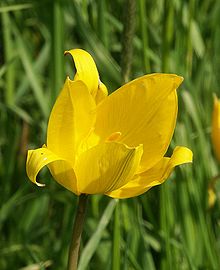United wineries Krebs-Grode
The United Wineries Krebs-Grode in Eimsheim are a winery in the German wine-growing region Rheinhessen .
history
In 1854, two wineries began to grow quality wine in the region: the Grode winery, which emerged from a Hubertushof in Gau-Odernheim , and the Krebs'sche winery.
Since 1966, the goods have been jointly managed from the current headquarters in Eimsheim . Like many companies in the Rhine-Hesse region, they used to be mixed farms. The conversion and concentration on a specialized wine-growing company began in 1985 with the marketing of bottled wine . The winery has been recommended by the DLG for several years.
The vinotheque in Gau-Odernheim was closed in 2017 and the Hofreite is for sale.
Grape varieties
Mainly white grape varieties are grown on 30 hectares. These are divided into Riesling , Silvaner , Müller-Thurgau , Pinot Blanc and Pinot Gris and Chardonnay for the white wine sector. Blauer Portugieser , Spätburgunder , Frühburgunder , Dornfelder and Lemberger are grown for the red grape varieties . These are supplemented by some newer grape varieties such as Scheurebe , Bacchus , Kerner , Albalonga or the red wine varieties Merlot and Cabernet Sauvignon newly approved in Rheinhessen .
Locations
The property includes different vineyards in seven different districts: Eimsheim , Alsheim , Guntersblum , Wintersheim , Hillesheim , Gau-Odernheim and Biebelnheim .
The vineyard tulip ( Tulipa sylvestris ), which is particularly protected in Germany, can be found in the Gau-Odernheimer Lieberg area below the Petersberg . Wines from this location are marked with a picture of the tulip on the label. The grapes are produced there in a biologically controlled manner. This means doing without herbicides , insecticides and acaricides . Through the growth of the tulips, a natural yield reduction is achieved, which the winery estimates at up to 40 hl / ha. The location is protected as a natural monument.
Outdoor operation
The areas of the combined wineries are cultivated according to the latest findings of integrated viticulture . This means that chemical pesticides are only used after a careful benefit-harm analysis. With a small eye cut per m², permanent greening in the rows of vines, thinning when there is strong growth or too many curtains and finally a selective hand-picking, the winery is able to produce expressive wines with high extract values and high must weights . There are strong loam - loess soils. In the past, greening was merely a surface covering, erosion protection and a measure for better mechanization, today it has far more tasks, not only from an ecological point of view, but also from a quality-increasing point of view.
Vinification
First of all, the wines are destemmed , then gently pressed using a membrane press (at a maximum pressure of 200 kPa). After fermentation and aging in stainless steel tanks, almost all wines are stored in wooden barrels until they are bottled.
Red vinification has been carried out as a must fermentation since the winery was founded . This technology makes it possible to produce varietal and low-sulfur wines with a high degree of digestibility. The result is fruity, soft and stomach-friendly red wines with a subtle tannin content, combined with a high aging potential.
Since the rosé wines are all made single-variety, they can be called Weißherbst .
Bottling
Around 300,000 bottles of wine and sparkling wine are produced annually:
- Simple bottles of wine are bottled in 1 liter Bordeaux bottles with a high-quality screw cap .
- The white estate and premium wines are sold in light green Bordeaux or dark green Schlegel bottles, the red ones only in Bordeaux bottles.
- Bottles with ice wine are still traditionally provided with tin capsules and wrapped in cellophane .
Awards
- In the Mundus Vini competition organized by Meininger Verlagsgesellschaft, an Albalonga Trockenbeerenauslese won the "Great Gold" award.
- DLG-TOP 50 The best wines of the year; Category "Edelsüß" in the DLG Wine Guide 2007
- The best winemakers in the International wine challenge awarded by Der Standard
- The winery has consistently won awards at the Austrian Wine Challenge since 2007.
Web links
- Website of the winery
- on Wein.de
- DLG national wine award: "DLG-TOP 50 The best wines" 2007
- House Krebs-Grode, old manor in Gau Odernheim
- Standard winners list: The best winemakers
Coordinates: 49 ° 47 ′ 46 ″ N , 8 ° 17 ′ 30 ″ E




